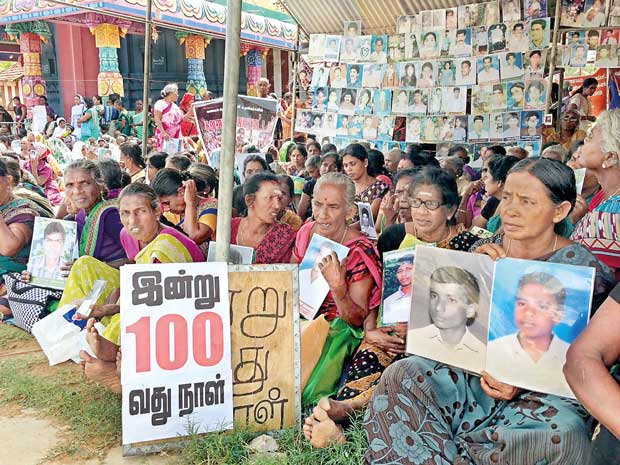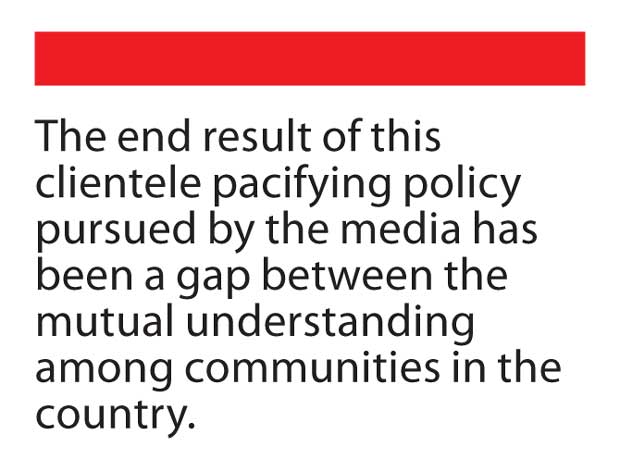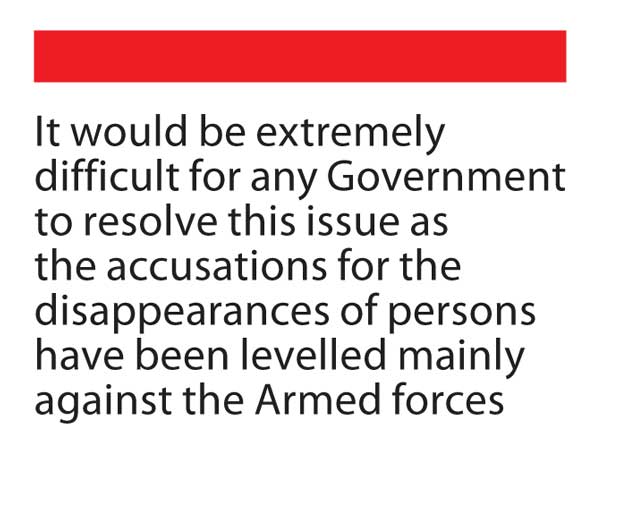30 Jun 2017 - {{hitsCtrl.values.hits}}
 No Sinhala or English language mainstream media had informed their clientele about three-month long struggles.
No Sinhala or English language mainstream media had informed their clientele about three-month long struggles.
The demonstrations in the north for justice for missing persons nonetheless had evoked President Maithripala Sirisena’s concerns.
 While the Parliament unanimously passed an Amendment to the Office of the Missing Persons (OMP) Act last week, relatives of the Tamil people gone missing during the war between the security forces and the LTTE crossed the 120th day of their sit-in protest in Kilinochchi.
While the Parliament unanimously passed an Amendment to the Office of the Missing Persons (OMP) Act last week, relatives of the Tamil people gone missing during the war between the security forces and the LTTE crossed the 120th day of their sit-in protest in Kilinochchi.
Similar campaigns by relatives of the missing persons in the North had reached 115 days in Vavuniya, 104 days in Mullaithivu and 97 days in Maruthankerny, all areas in the Northern Province by then.
Since one of the criteria of media, whether they are Sinhala or Tamil or English, in their choice of news and feature stories is to be careful not to hurt the sensitivities of its clientele, it is comprehensible as to why the Sinhala and English language media are so insensitive to those demonstrations of grief by the northern people.
No Sinhala or English language mainstream media had informed their clientele about these month
long struggles.
However, this is not the nature of those media alone. When the LTTE had blasted bombs in buses or trains in the south or when hundreds of people were hacked to death by the LTTE in villages bordering the northern and the Eastern Provinces during the war, the Tamil media also failed to convey the gravity of horror felt by the Sinhalese and Muslim victims of those attacks.
The end result of this clientele pacifying policy pursued by the media has been a gap between the mutual understanding among communities in the country.
Thus, Sinhalese question as to what the problems are faced only by the Tamils for them to demand a separate State or at least a separate administrative unit, while the Tamils on the other hand, raise the question as to why the Sinhalese suspect them not to grant the limited autonomy they have been demanding for the last four decades.
The demonstrations in the north for justice for missing persons nonetheless had evoked President Maithripala Sirisena’s concerns.
He had met the representatives of the agitating relatives of northern missing persons on June 12 at the Northern Province Governor’s office. Several relatives of missing persons representing eight districts of Northern and Eastern Provinces attended the meeting at the Governor’s office.
They had put forward five demands requesting the release of lists of all who surrendered to the armed forces, during and after the war, particularly during the last phase, a list of all secret detention centres, their status and list of detainees, and a list of all political prisoners held under the Prevention of Terrorism Act (PTA).

The President said that he would meet the senior officers of the Tri-forces during the National Security Council meeting in Colombo and would order them to release the details of those who surrendered or those arrested by the armed forces at various time periods, in order to obtain information about the victims of alleged enforced disappearances.

When some persons alleged that their relatives were detained in some camps, the President had immediately said that if they could identify any place, he would send Police together with them to go into such camps and search. However, there are no reports of anyone having come
forward accordingly.
Going by the stories in the Tamil newspapers after the President’s Jaffna visit it is clear that the relatives of the missing persons are sceptical of the President’s promise.
On the other hand it would be extremely difficult for any Government to resolve this issue as the accusations for the disappearances of persons have been levelled mainly against the Armed forces of the country and no Government would resort to antagonise a large number of armed forces personnel.
The number of people killed and gone missing during the war is a highly contentious issue as no reliable or scientific study has been carried out by the State or any other agency, leading to many people making various claims in line with their political affiliations.
The number of people killed had been between 7000, a claim by the government and 500,000 which has been put forward by the Tamil
Nadu leaders.
Local Tamil leaders, striking a balance between these claims put it in a range between 75,000 and 150,000.
A similar discrepancy in the claims on the number of people who disappeared has, in a way, diluted the gravity of the problem. The irony has been that the Tamils want to see more of their compatriots killed or disappeared, while the Sinhalese prefer to see less Tamils killed or disappeared.
Sri Lanka is faced with the problem of missing persons since late eighties, despite people in large numbers having disappeared during the first JVP insurrection in 1971 and the rebellion by the Tamil armed groups in early eighties. Several Presidents have appointed commissions to look into those allegations which ultimately vanished into the thin air.
First such commission was appointed in 1992 by President R. Premadasa whose regime was accused of thousands of disappearances.

And later President Chandrika Kumaratunga had appointed a national missing persons commission as well as three zonal commissions to look into the incidents that had taken place during the same period. But all of those commissions also ultimately went missing without producing results. It was in that light, the Human Rights Watch and the Amnesty International had several times alleged that Sri Lankan Governments appointed such commissions whenever international pressure mounted.
The month-long protests now being carried out by the relatives of the missing people are not the first of the kind. Apart from the occasional such demonstrations the Tamil media, during the past eight years since the end of the war have been invariably carrying news items, feature articles with highly emotional anecdotes and interviews, keeping the issue live among the Tamil people around
the world.
Among them there had been occasional stories about more than 40 top LTTE leaders such as Baby Subramaniam, LTTE military Spokesman Ilanthiraian and Yogi having surrendered to the army.
While the south is being ignorant or in denial of these claims, the repeated expressions of real grievances by the relatives of northern missing persons couples with the Tamil media-hype and the politics of Tamil leaders have created a notion around the world that only the armed forces personnel had committed crimes during the war, absolving the LTTE and the other armed groups.
The recent report presented by the UN Human Rights Chief Prince Zeid Al-Hussein in the UNHRC attest to it. Although the Government is between the devil and the deep blue sea in this regard, its indifference or lethargy seems to be not to be in favour of it.
30 Oct 2024 10 minute ago
30 Oct 2024 33 minute ago
30 Oct 2024 1 hours ago
30 Oct 2024 4 hours ago
29 Oct 2024 29 Oct 2024